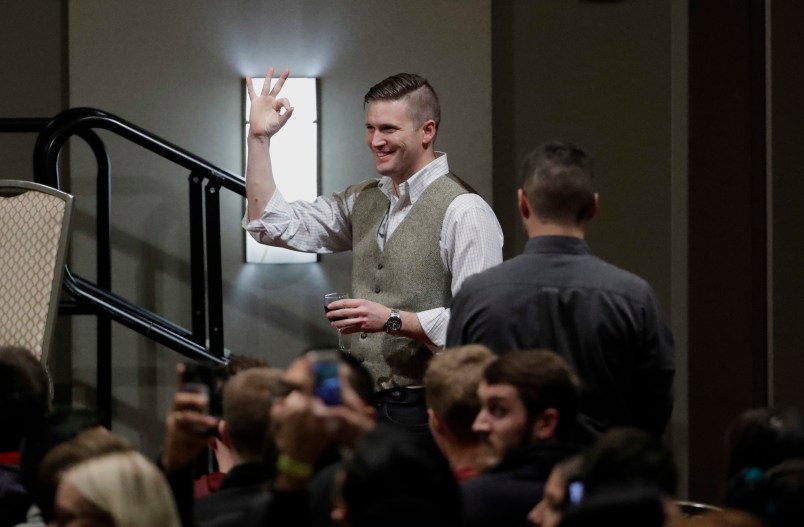White nationalist Richard Spencer says he first learned of “flash mobs” from a viral YouTube video that showed dozens of people twirling around Antwerp, Belgium’s Central Station in a spontaneous, coordinated performance of the Sound of Music’s “Do-Re-Mi.”
He told TPM he’s trying to adapt that absurdist concept for an entirely different purpose: unannounced public expressions of pro-Confederate, white nationalist sentiment, like Saturday’s 15-minute long torch-lit rally in Charlottesville, Virginia.
Both the last-minute rally organizers and policing experts point out that this is one of the few types of events that white nationalists can expect to pull off after their 1500-person strong August rally in Charlottesville devolved into deadly chaos. With something like Saturday’s flash mob, it’s easier to control who participates and the counter-protesters who flocked to their previous events don’t have any advance notice. Those conditions provide white nationalists with a less fraught, if inherently sillier, method of keeping their names in the headlines.
“If the goal is to get attention to bring a light to their antics on a small stage, I don’t think there’s any question that it’s working,” Seth Stoughton, a policing expert at the University of South Carolina School of Law, told TPM.
Stoughton pointed out that unlike the August “Unite the Right” rally, which was intended to bring different factions of the racist and neo-Confederate far-right together, a smaller event like Saturday’s flash mob is “directed outward,” at the media and at communities like Charlottesville.
But the attention these events draw is much more limited, and such rallies’ small size serves as evidence to those who oppose white nationalists’ message that mass public backlash is an effective protest tactic.
“It’s a sign that as a physical presence they are not able to pull off the kind of thing they’ve done in the past,” David Harris, a professor on policing and national security issues at the University of Pittsburgh School of Law, told TPM of these smaller demonstrations.
“After Charlottesville, [Spencer] said ‘We’re going to be back; you haven’t seen the last of us,” Harris continued. “This fulfulls that pledge, if you like, but it also exposes the current weakness of their position in terms of what they’re actually able to do.”
The flash mob model is limited by various logistical constraints. Organizers can’t use public social media accounts to attract participants; need attendees to live in close proximity to the chosen location so that they can travel there on relatively short notice; and only so many participants can be invited without word leaking out.
Spencer and Mike Enoch, the creator of a white nationalist blog who attended the Saturday event, both acknowledged those limitations. But they said the point of the demonstration was simply to get their message out without their opponents learning about the events and shutting them down.
“We want to show that we have the logistics and the apparatus to do these things on short notice and without any warning to the places where we’re gonna show up,” Enoch said, adding that “the statement we wanted to make didn’t require 1500 people.”
Spencer, Enoch, and Identity Evropa leader Eli Mosley were among the 40-something people that showed up on the University of Virginia’s campus on Saturday evening after driving down from Washington, D.C.
The students they encountered there seemed uninterested in what the spontaneous ralliers had to say. Spencer said a group of undergraduates was having a house party right near the spot where they disembarked and lit up their tiki torches; realizing what was happening, the students immediately tipped off the police.







“Now Wary Of Holding Big Rallies, White Nationalists Resort To Tiny ‘Flash Mobs’”
Tiny mobs for tiny minds.
I believe German gangs used to call these events “patriotic meetings” complete with one-armed salutes to the Swastika flag.
Ah yes. Kristalnacht was comprised of many such 15 minute interludes. It’s more than enough time for efficient and enthusiastic youth to smash out all the windows and set fire to the synagogue.
Fixed.
Don’t these nazi assholes have to get a permit to protest on a college campus in advance? Calling for a flash mob should get them booted off campus or other places by law enforcement sooner for not doing so I would think, providing law enforcement does their job in providing public safety.